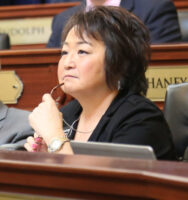Senate Education Committee Chairman Dean Mortimer called on legislative budget writers to invest in a fourth consecutive year of raises for teachers.
On Wednesday, Mortimer and House Education Committee Chairwoman Julie VanOrden briefed members of the Joint Finance-Appropriations Committee on the committees’ budget priorities.
The briefing was an important moment for lawmakers as JFAC prepares to set the public school budget on Monday morning.
Both Gov. Butch Otter and Superintendent of Public Instruction Sherri Ybarra have recommended spending more than $40 million in new funding for raises through the career ladder salary law.
Mortimer, R-Idaho Falls, said the Legislature made a five-year commitment to raises, which he said represents “continued appreciation and encouragement to teachers and pupil services staff that work so hard to educate our children.”
On top of that, Mortimer urged targeted or increased investments in a number of programs:
- operations funding
- literacy
- career counseling
- technology
- health care costs for employees.
VanOrden, R-Pingree, had a different message. She urged caution and suggested budget writers take a step back.
Following a contentious House Education Committee Tuesday, VanOrden suggested Wednesday that lawmakers really don’t know to what degree some recent education initiatives are providing a return on investment. Specifically, VanOrden said results are inconclusive about two recent programs — the K-3 literacy initiative and an increase in college and career counselors.

“Until, I guess, we see some information that says if it’s helping it, or not enough money and we need more, I’m kind of in limbo on that, probably neutral,” VanOrden said, specifically referencing the college and career counseling initiative.
VanOrden called herself a champion of literacy who has pushed for change for years. But she suggested different changes may be in order, and urged budget writers to take time to review “proven” initiatives that other states have rolled out and found success with.
A day earlier, during Tuesday’s House Education meeting, State Board of Education Executive Director Matt Freeman presented a report to VanOrden’s committee that reported the Garden Valley School District, Syringa Mountain School and North Valley Academy did not follow state law and failed to post both their district’s continuous improvement plans online and neglected to turn in plans for using state dollars to implement the K-3 literacy improvement plans, as required by state law. Rep. Ryan Kerby, R-New Plymouth, argued that districts are overburdened with compliance and paperwork requirements, which he said aren’t driving improvements in student learning. VanOrden countered Kerby by saying that some compliance and accountability reports are mandated by law in order to give legislators and the public insight into how millions of dollars in taxpayers’ funds are spent and whether or not programs are producing a return on investment.
As for the school budget, both Ybarra and Otter are recommending the Legislature increase K-12 spending by more than $100 million over current levels.
Neither VanOrden nor Mortimer spent any significant time Wednesday discussing higher education initiatives or college and university budgets.
The biggest difference between the two K-12 budget proposals is that Ybarra is calling for increasing funding to cover health care costs for employees and increasing operations funding for districts, while Otter is recommending no funding increase in either of those areas.
Education spending is the state’s largest expense. K-12 spending accounts for 48 percent of all general fund spending. Once higher education is taken into account, overall education spending represents about 63 percent of Idaho’s general fund spending.
Check back with Idaho Education News on Monday afternoon for full coverage of the budget setting hearing.
